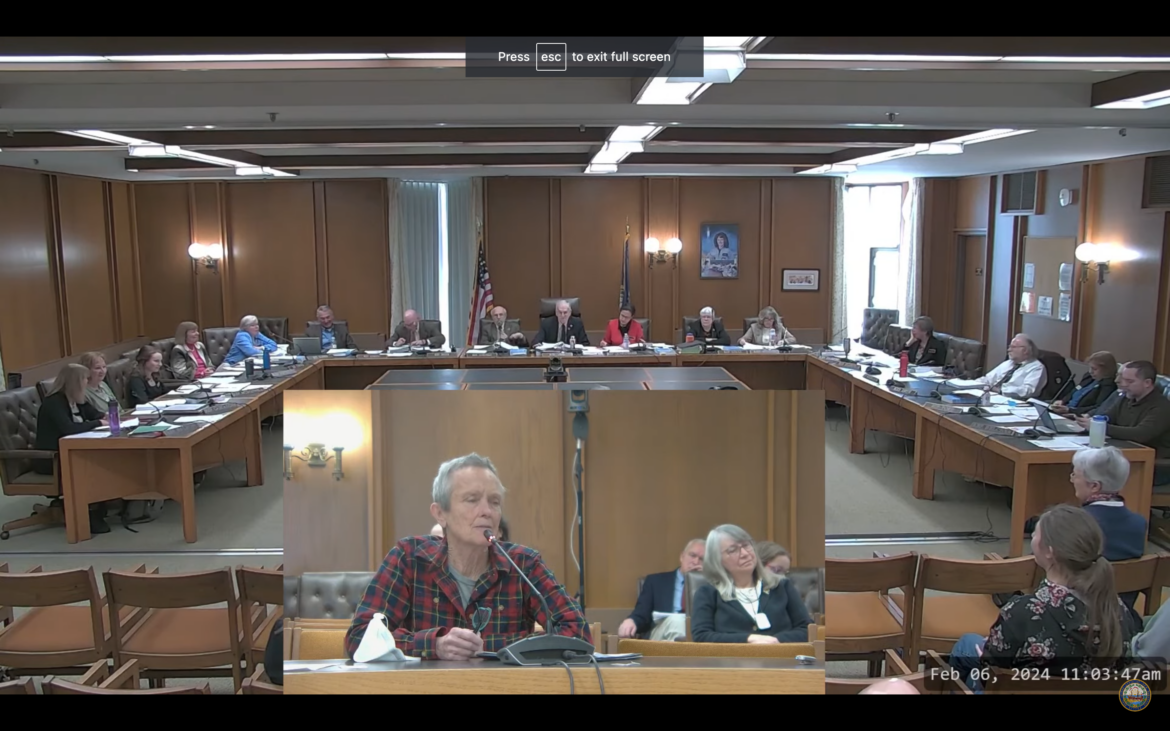By GARRY RAYNO, InDepthNH.org
CONCORD — A bill banning public school educators and staff from using students’ names or pronouns different from those given at birth without parental permission is disrespectful and harmful, a House committee was told Tuesday.
Almost all of the testimony on House Bill 1356 was opposed to the bill, that many said could make transgender students targets, and more likely to face thoughts of suicide and depression.
But one of the sponsors of the bill, Rep. Mike Ouellet, R-Colebrook, said the bill is called the Given Name Act. “A child’s name is first chosen by the parents and this bill makes no question who decides after that,” he said.
Some schools encourage teachers to call transgender students by the names and pronouns they choose without parents’ permission, he said. “Highjacking names may be more widespread than you think,” Ouellet told the House Education Committee.
He said teachers have no right to use different names for the students without parental permission, because control of a child’s name belongs with the parents.
The bill also allows teachers to refrain from using a child’s different name or pronouns if it is contrary to the teacher’s beliefs and religion, he noted.
Ouellet said the only exception would be for a nickname the parents put on a form for the school.
He said staff members like school lunch workers or bus drivers would also be prohibited from using a student’s chosen name or pronoun.
Ouellet said a school form the student fills out with a different name than the one given at birth may be the first indication to a parent the child is exploring a different gender.
But David Trumble of Weare said the bill would cover a fairly large community of students who do better emotionally and socially if they feel supported.
“Parents have a fundamental right to raise their child (as they see fit), but they have no right to use the school as a surveillance tool,” Trumble said. “Whose life are we talking about, the parents’ life or the child’s life. We should look at the child and their wellbeing to guide our decisions.”
Rep. Linda Tanner, D-Sunapee, who was a physical education teacher and coach, noted kids on sports teams often have nicknames for each other like “Flash.” Would the coach need a parent’s permission to use that name, she asked, and Ouellet said yes.
Other committee members raised issues over nicknames and how such information would be distributed to all those covered by the prohibition. Some also wondered why a teacher should be allowed not to respect a student’s wishes for names or pronouns because of the teacher’s religion or beliefs.
Jonah Sutton-Morse of Canterbury said he is a Quaker and the proud parent of a transgender child, who, according to his beliefs, wants his child to be called by their chosen name and pronouns.
A person’s biological sex at birth is a useful indicator, he said, but not necessarily a true marker of identity which comes from your own life and experience.
To treat his child differently would violate his moral and religious convictions, Sutton-Morse said, and to use religion to deny that, destroys their wishes and his child’s identity.
His child Nax, who is 12 years old, said the name on their birth certificate is not their name and related pronoun. To use the wrong name and pronoun is like taking away their identity, Nax told the committee.
To ensure students learn in a safe environment, teachers have to accept students for who they are, noting if they are calling students by another name and use another pronoun, that does not ensure a safe environment.
If people do not believe in transgender transformations, Nax said, “they do not believe who I am is real and that takes away my identity.”
A retired teacher, Sarah Smith, told the committee not using a student’s chosen name and pronoun is like using a racial slur, which is hate speech.
Attorney Amy Manzelli of Pembroke, who has a transgender 14-year-old daughter Iris, said there is a litany of Supreme Court decisions overturning laws that target minorities.
“It is un-American to target minorities,” she said noting, there have been more and more bills proposed that target the LGBTQ communities.
She said her daughter comes home from school with many questions, such as why people feel she is dangerous to use the bathroom or play sports with other girls. Or why she thought she had civil rights, Manzelli said, noting it is nearly impossible to answer her questions.
Iris Turnelle said if the bill passes she does not want to stay in New Hampshire, she would not want to share her personal stories with her teachers and would not want to go to school.
“When they say my dead name, it is like torturing me,” she said. “What has been proposed here is like torture to me and I wish it would stop.”
Gilles Bissonnette, legal director of the American Civil Liberties Union — NH, said everyone in high school engages in identity exploration, the “intimate parts and concepts of who we are to friends and even a trusted school teacher.”
The bill undermines that, he said, and hinders the ability of students to safely identify by their chosen name and pronouns.
He said there are a host of legal concerns about the bill with a number of problematic areas.
Nancy Brennan, a former high school teacher from Weare, said as a teacher she prided herself in paying attention to students and listening to them, not grooming them.
“I know how hurt kids are when they are bullied,” Brennan said, “and this is bullying.”
The bill was opposed by the National Alliance on Mental Illness NH and New Futures. Only one person spoke in support of the bill.
According to the electronic filing on the bill, 278 people opposed the bill, and 11 supported it.
Garry Rayno may be reached at garry.rayno@yahoo.com.





